I just can't take it anymore.
Whether it's malicious clickbait or genuine jumping to conclusions after a pilot episode or first listen, immediate reactions to media have become everywhere in the 2020s. You can't open social media these days without seeing sensationalized, and frankly, mind-numbing reactions and generalizations about an entire show just based off one episode.
Much of the issue comes down to engagement, which prompts creators and media outlets to pump out a review, episode by episode, as soon as the end credits roll.
The average consumer does not want to wait eight or 10 weeks for a show or season to end to consume media or engage in any discourse about it — which is fair.
Intentionally or not, this often leads to faulty logic and criticisms that can fester into common beliefs.
In the first episode of 2024's "The Acolyte," a main character puts out a fire in space. Content on every platform scathed this to millions of views, thousands of hate Tweets and an overall shift in discourse from the initial excitement around new Star Wars content.
But wait. This has existed in Star Wars … always. Fire happens in space in this world. Even George Lucas has addressed this jokingly, it's there when he wants it. Yet without time to think it through, anger spread like wildfire on social media and a damaging narrative was created.
Many people quickly corrected this, but the sensational opinion will almost always spread farther. It's true in all news: Not everyone will see the correction.
I'm not asking anyone to pretend or make themselves enjoy something even though they hated it. But is it too much to ask to just let something breathe for a moment, or God forbid exist in its entirety before the engagement farmers of the internet spew slop to their millions of followers?
I don't even care if the show sucks. "The Acolyte" was riddled with flaws and incredibly boring, in my opinion, for the first few weeks — and only redeemed itself to average by its finish. Still, I find myself wanting, needing to defend it against these ridiculous generalizations just because no one even took a moment to give it a chance.
"But why would I care?" you say. "Disney loses money. Womp womp." To which I agree.
However, normalizing this culture has infected mediums at all levels.
It's the same thing for music. I simply can't understand trying to rate an album or a song precisely or attempt to review it for others, on only one listen. Even more so than movies or TV, music needs to breathe.
Music is so closely intertwined with living, with experience, with time that it's almost impossible for me to feel a strong connection with something right away, even with albums I'll grow to love every part of later.
There can be exceptions, of course. There's just a difference between listening or watching something once and telling everyone "I love it so much it's perfect" and doing the opposite.
Praise makes people go give the art a chance, whether they will like it or not. But instant hate — that's often trivial — can do permanent damage to a project's public image.
It all boils down to people not wanting to form their own opinions. Everyone hates the end of "Game of Thrones," but usually just the last two episodes. It's not just the last two episodes, though. "Beyond The Wall," episode 6 of season 7, is one of the stupidest episodes of TV I've ever seen — but the IMDB rating is somehow a 9.0.
All of season 7 is borderline unwatchable, yet the average rating is still extremely high. Somehow, what I feel is obviously a huge decline of one of TV's best shows isn't as unwatchable to everyone — and I truly believe it is only because public opinion hasn't spread past the dismal finale.
Most of the time, media is neither amazing nor horrible: it's just ... fine. But sensational coverage — and the people who perpetuate it — want you to think everything is some kind of superlative.
Much of the blame falls on creators and publications who spark negative discourse, yet as consumers, we need to be more conscious of the way we treat art on first listen. Again, I'm not asking for anyone to pretend to like something they don't, but giving into sensationalism is letting clickbait culture win.
Maybe I'm being too optimistic about the potential of your average internet consumer, maybe there is truly no hope for conversations around media to be somewhat thoughtful or nuanced. But I can't help but try. I love art and its discourse too much not to.
Edited by Senna James, Sophia Braccio and Natalia Jarrett.
Reach the reporter at adirst@asu.edu and follow @andrewdirst on X.
Like The State Press on Facebook and follow @statepress on X.
Andrew is a senior studying journalism and mass communication. This is his fourth semester with The State Press. He has also worked at The Arizona Republic and Cronkite News.




